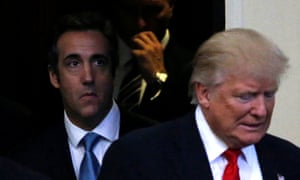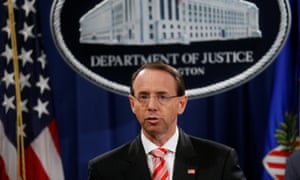
"When he promised to put America first in his inaugural speech, Donald Trump drew on a slogan with a long and sinister history – a sign of what was to follow in his presidency
Sarah ChurchwellLast modified on Mon 23 Apr 2018 07.49 EDT“Sadly, the American dream is dead,” Donald Trump proclaimed when he announced his candidacy for president of the United States. It seemed an astonishing thing for a candidate to say; people campaigning for president usually glorify the nation they hope to lead, flattering voters into choosing them. But this reversal was just a taste of what was to come, as he revealed an unnerving skill at twisting what would be negative for anyone else into a positive for himself.
By the time he won the election, Trump had flipped much of what many people thought they knew about the US on its head. In his acceptance speech he again pronounced the American dream dead, but promised to revive it. We were told that this dream of prosperity was under threat, so much so that a platform of “economic nationalism” carried the presidency.
Reading last rites over the American dream was disquieting enough. But throughout the campaign, Trump also promised to put America first, a pledge renewed – twice – in his inaugural address. It was a disturbing phrase; think pieces on the slogan’s history began to sprout up, explaining that it stretches back to efforts to keep the US out of the second world war.
In fact, “America first” has a much longer and darker history than that, one deeply entangled with the country’s brutal legacy of slavery and white nationalism, its conflicted relationship to immigration, nativism and xenophobia. Gradually, the complex and often terrible tale this slogan represents was lost to mainstream history – but kept alive by underground fascist movements. “America first” is, to put it plainly, a dog whistle. The expression’s backstory seems at first to uncannily anticipate Trump and (at least some of) his supporters, but the truth is that eruptions of American conservative populism are nothing new – and “America first” has been associated with them for well over a century. This is merely the latest iteration of a powerful strain of populist demagoguery in American history, from president Andrew Jackson (1829-1837) to Louisiana senator Huey Long a century later – one that now extends to Trump.
The slogan appears at least as early as 1884, when a California paper ran “America First and Always” as the headline of an article about fighting trade wars with the British. The New York Times shared in 1891 “the idea that the Republican Party has always believed in”, namely: “America first; the rest of the world afterward”. The Republican party agreed, adopting the phrase as a campaign slogan by 1894.
By 1916 'America first' had become so popular that both presidential candidates used it as a campaign sloganA few years later, “See America First” had become the ubiquitous slogan of the newly burgeoning American tourist industry, one that adapted easily as a political promise. This was recognised by an Ohio newspaper owner named Warren G Harding, who successfully campaigned for senator in 1914 under the banner “Prosper America First”. The expression did not become a national catchphrase, however, until April 1915, when President Woodrow Wilson gave a speech defending US neutrality during the first world war: “Our whole duty for the present, at any rate, is summed up in the motto: ‘America First’.”
American opinion was deeply divided over the war; while many decried what was widely perceived as a baldly nationalist venture by Germany, there was plenty of anti-British sentiment, too, especially among Irish-Americans. American neutrality was by no means always motivated by pure isolationism; it mingled pacifism, anti-imperialism, anti-colonialism, nationalism and exceptionalism as well. Wilson was delivering the “America first” speech with his eye on a second presidential term: “America first” should not be understood “in a selfish spirit”, he insisted. “The basis of neutrality is sympathy for mankind.”
First in line … Republican national convention in Cleveland, Ohio, 2016.First in line … Republican national convention delegates in Cleveland, Ohio, 2016. Photograph: Joe Raedle/Getty ImagesThe phrase was rapidly taken up in the name of isolationism, however, and by 1916 “America first” had become so popular that both presidential candidates used it as a campaign slogan. When the US joined the war in 1917, “America first” was transposed into a jingoistic motto; after the war, it slipped back into isolationism. In the summer of 1920, Senator Henry Cabot Lodge delivered a keynote speech at the Republican National Convention, denouncing the League of Nations in the name of “America first”. Harding secured the Republican nomination and promptly sailed to victory that November using the slogan, which his administration would invoke ceaselessly before it collapsed amid the ruins of the US’s greatest political bribery scandal to date.
By 1920, “America first” had joined forces with another popular expression of the time, “100% American”, and both soon functioned as clear codes for nativism and white nationalism. It is impossible to grasp the full meaning of “100% American” without recognising the legal and political force of eugenicist ideas about percentages in the United States. The so-called “one-drop rule” – which said that one drop of “Negro blood” made a person legally black – was the foundation of slavery and miscegenation laws in many states, used to determine whether an individual should be enslaved or free. The logic of the one-drop rule extended from the notorious three-fifths compromise in the constitution, which counted slaves as three-fifths of a person. Declaring someone 100% American was no mere metaphor in a country that measured people in percentages and fractions, in order to deny some of them full humanity.
In 1920 Upton Sinclair published a furiously satirical novel called 100%: The Story of a Patriot, inspired by the case of a radical, Tom Mooney, who was sentenced to hang for a 1916 bombing on charges widely viewed as spurious. Sinclair’s novel is told from the perspective of Peter, “a patriot of patriots, a super-patriot; Peter was a red-blooded American and no mollycoddle; Peter was a ‘he-American’, a 100% American ... Peter was so much of an American that the very sight of a foreigner filled him with a fighting impulse.”
Peter fully believes that:
100% Americanism would find a way to preserve itself from the sophistries of European Bolshevism; 100% Americanism had worked out its formula: “If they don’t like this country, let them go back where they come from.” But of course, knowing in their hearts that America was the best country in the world, they didn’t want to go back, and it was necessary to make them go.
But “100% American” was not only xenophobic and nativist. When Senator Knute Nelson died in 1923, he was hailed in obituaries across the US as “100% American” – despite having been born in Norway. Why? Because Nelson was descended from “the true Nordic line”, “from the race which set up strong gods and bred strong men”.
“Nordic” was yet another code, used in the same ways that the Nazis would use “Aryan”. “Nordicism” held that people of northern Europe were racially superior to those of southern Europe (and everywhere else), a theory espoused by white supremacists such as Lothrop Stoddard and Madison Grant, whose The Passing of the Great Race: or The Racial Basis of European History (1916) became one of the most influential works of eugenicist scientific racism. But in practice, Nordic was used to describe anyone who was blond, white, Caucasian or Anglo-Saxon. Colloquially, “Nordic”, “100% American” and “America first” were used all but interchangeably.

A 1927 Ku Klux Klan parade in Washington DC.A 1927 Ku Klux Klan parade in Washington DC. Photograph: Buyenlarge/Getty ImagesIt should come as little surprise, then, that the Ku Klux Klan also adopted “America first” as a motto. In 1919 a Klan leader gave a Fourth of July speech declaring: “I am for America, first, last and all the time, and I don’t want any foreign element telling us what to do.” The fantasy of a US once populated solely by the racially pure Nordic “common man” was the Klan’s genesis myth as well, the prelapsarian past to which they intended to force the country to return – by violence if necessary.
In January 1922, the Klan staged a parade in Alexandria, Louisiana, bearing two flaming red crosses and banners with slogans including “America First”, “100% American” and “White Supremacy”. That summer the Klan took out an advertisement in a Texas newspaper: “The Ku Klux Klan is the one and only organization composed absolutely and exclusively of ONE HUNDRED PER CENT AMERICANS who place AMERICA FIRST.”
If the Klan were allowed to take over the US, one newspaper cautioned, 'we shall have a dictatorship'Within months, Americans were watching the rise of fascism in Europe, as Mussolini took power in Rome. Explaining “fascists” to American readers that year, the press found an obvious example ready to hand. “In our own picturesque phrase,” wrote the New York World, “they might be known as the Ku Klux Klan.” It does not require hindsight to view the Klan as a crypto-fascist organisation: their contemporaries could instantly see the likeness, and the danger. In November 1922 a Montana paper noted that, in Italy, fascism meant “Italy for the Italians. The fascisti in this country call it ‘America first’.” There are plenty of the fascisti in the United States, it seems, but they have always gone under the proud banner of “100% Americans”.
The autumn of 1922 also saw the first mention of a rising German fringe politician called Adolf Hitler in the US press. At the time, a young American journalist named Dorothy Thompson was living in Vienna, where she was reporting on the rise of antisemitism. By November 1923, she was in Munich trying to interview Hitler following his abortive Beer Hall Putsch, filing articles on the way he had updated German nationalism thanks to “suggestions from Mussolini”.
Meanwhile, the Brooklyn Daily Eagle warned its readers that the KKK was no different from “100 % patriotism in Europe”:
There should be no misunderstanding about the Klan. It represents in this country the same ideas that Mussolini represents in Italy; that Primo Rivera represents in Spain. The Klan is the American Fascista, determined to rule in its own way, in utter disregard of the fundamental laws and principles of democratic government.
If such people were allowed to take over the US, it cautioned, “we shall have a dictatorship”.
By 1927, the Klan had spread across the country. That May, roughly 1,000 Klansmen gathered to march in the Memorial Day parade in Queens, New York, many in white robes and hoods, accompanied by 400 members of their women’s organisation, the Klavana. Some of the reported 20,000 spectators in Queens that day objected to the Klan’s presence in a civic parade; fights broke out, and it turned into a riot. In the days that followed, the New York papers revealed the names of a total of seven men who had been arrested in Queens. Five of them were identified as “avowed Klansmen” who had been marching in the parade and were arrested for “refusing to disperse when ordered”. A sixth was a mistake – a car had run over his foot – and he was immediately released. The seventh, a 21-year-old German-American, was not identified in the press as a Klansman. The reports only stated that he was arrested, arraigned and discharged. No one knows why he was there. His name was Fred Trump.
In September 1935, a month after announcing he would run for president, Senator Long of Louisiana was assassinated. Called “America’s first dictator”, Long had worried many observers with his blend of populism and authoritarianism. After his death, one writer referred to Long as “the Mississippi valley rendering of Il Duce”. Despite assurances from many Americans that it can’t happen here, Long’s rise to power had shown just how it could. Its growing presence was so clear that at the end of 1935 Sinclair Lewis published a novel inspired by Long’s career (but written before his murder), in which he imagined what American fascism would look like. The title of It Can’t Happen Here was “ironical”, Lewis told reporters: “I don’t say fascism will happen here,” he said, “only that it could.”
Lewis and Thompson had married in 1928, and his novel was heavily influenced by her circle’s conversation about the situation in Europe. She had just become the first American foreign correspondent to be ejected from Germany by Hitler, making her an international celebrity. “Whatever else the Hitler revolution may or may not be,” she wrote, “it is an enormous mass flight from reality.” On her return to the US, Thompson was given a nationally syndicated newspaper column; immediately she began writing about the emergence of bands of loosely organised fascists around the US, where a “Union party” had assembled to unite the right, creating an amalgamation of white supremacist fascist groups.
One of Thompson’s columns on American fascism was titled “It Can Happen Here”, in which she asked:
Whom do they hate? Life, which has treated them badly. Who is to blame? Some scapegoat is to blame. The Negroes working in the fields that should be theirs? Or the Jews? Do they not keep the prosperous shops? Or the Communists … or the trade unionists … Or the Catholics who have a Pope in Rome? Or the foreigners who take the jobs? These are to blame. Therefore exterminate them. We are poor and dispossessed. But we are white, Anglo-Saxon, Protestant. Our fathers founded this country. It belongs to us.
Just as Thompson’s column was published, in May 1936, William Faulkner finished Absalom, Absalom!, a novel driven by the proposition that what had defined southern history was the fact that poor white people gained self-respect and racial pride from their belief in their inherent superiority to black people. If that sense of racial superiority were ever threatened, the story predicted, they would erupt in violence. A year earlier, WEB Du Bois had explained that “white laborers were convinced that the degradation of Negro labor was more fundamental than the uplift of white labor”. Although white labourers remained poor, Du Bois wrote, they were “compensated in part by a sort of public and psychological wage”, the wage of racial superiority.
In the autumn of 1940, a coalition of Americans against US entry into the second world war formed the America First Committee. Charles Lindbergh would become their spokesman, Thompson perhaps their fiercest opponent. “I am absolutely certain in my mind that Lindbergh is pro-Nazi,” she wrote in 1941. “He hates the present democratic system and … intends to be President of the United States, with a new party along Nazi lines behind him.” By May 1941, Lewis had joined the America First Committee, while he and Thompson had quietly separated. According to Lewis’s biographer, he was “at that time vigorously opposed to American intervention in the European war … his sympathies with the America First people”.
In August 2017, seven months into Donald Trump’s presidency, a coalition of American fascists calling themselves Unite the Right staged a rally in Charlottesville, Virginia. It came as a shock to many observers that the Klan and neo-Nazis could march in modern America, shouting: “Jews will not replace us.” It came as a greater shock that Trump refused to condemn them.
When the story emerged during the 2016 campaign that Trump’s father had been arrested at what was often described (erroneously) as a “Klan rally”, Trump at first denied that the Fred Trump in question was his father, saying they’d never lived at the address named in the newspaper reports. But although Donald never lived there, the Trump family did. There is no evidence that Fred was at the 1927 Memorial Day parade to support the Klan. What’s remarkable is that, of the parade’s 20,000 spectators, the only six who were arraigned after the riots were five “avowed Klansmen”, and Fred Trump.
Donald has spoken often, and proudly, of the father he idolised. “My legacy has its roots in my father’s legacy,” he stated in 2015. There is good reason to think eugenics plays a role in that legacy. “The family subscribes to a racehorse theory of human development,” said one of Trump’s biographers, Michael D’Antonio. “They believe that there are superior people and that if you put together the genes of a superior woman and a superior man, you get a superior offspring.” Trump also endorsed a garbled version of eugenics in a 2010 interview: “I think I was born with the drive for success because I have a certain gene. I’m a gene believer.” And while it is true that no one knows why Fred Trump was arrested along with five members of the Klan in 1927, it is also true that his later record would not suggest he was there to protest against the Klan. Maybe it was all just a coincidence.
Or maybe not. In October 2017, the New York Times reported that Trump’s close adviser, Stephen Miller, chose “100% Americanism” as a quotation for his high school yearbook page. Trump made international headlines in January 2018 when he demanded during discussions of immigration from Haiti and Africa why he would want “all these people from shithole countries”, adding that he wanted “more people from places like Norway”. Commentators noted that Norway is overwhelmingly ethnically white, but many were puzzled by what seemed an arbitrary preference. “Why Norway?” asked a Houston Chronicle report, highlighting the “racialism” of the choice; it added that the neo-Nazi website Daily Stormer had approved Trump’s remarks, which indicated: “Trump is more or less on the same page as us.” The Chronicle did not, however, mention that the page in question continues to specify Nordicism per se – and “America first” – as its racial ideal for the US.
We cannot hear a dog whistle if we are not in its range. We cannot understand the subtexts of our own slogans if we do not understand their contexts; we risk misreading our own moment if we don’t know the historical meanings of expressions we resuscitate, or perpetuate. We are all asking urgent questions about the present, but there are far more surprising answers than many think to be found in the past. The backstory of loaded phrases can help us understand how we found ourselves facing these problems today – and even, perhaps, how to stop them from detonating into violence once more •
End of the American dream? The dark history of 'America first' | Books | The Guardian: ""
























